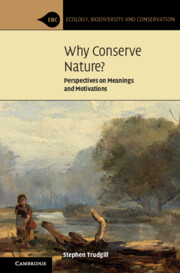7 - Possibilities
from Part IV - Why Conserve Nature?
Published online by Cambridge University Press: 03 February 2022
Summary
We tend to think that diversity is good, and indeed we seem to find it psychologically attractive and intellectually interesting. But what does biodiversity mean? It can be applied to some form of enumeration – the number of species – or simply be used as a portmanteau word, referring to ‘wildlife’. In thinking about what biodiversity means, tellingly, Perlman and Adelson (1997): 25) ask: “If biodiversity is good, is more biodiversity always better than less biodiversity?”. Why does having more species matter? In Chapter 1 we asked whether functionality was really the key to why species matter – after all, different species can perform similar functions. And if the functionality of an ecosystem varies, then the system is different – but again we conflate such changes with worth and value judgements. Preference and prejudice seem to confound our thinking.
- Type
- Chapter
- Information
- Why Conserve Nature?Perspectives on Meanings and Motivations, pp. 277 - 350Publisher: Cambridge University PressPrint publication year: 2022



